ILLUSTRATION CONTEST 2024
Column
A Conversation with
Two Pokémon TCG Official Illustrators
Kouki Saitou and Tomokazu Komiya
The following is a dialogue between veteran artists Kouki Saitou and Tomokazu Komiya, who have been working on illustrations for the Pokémon TCG for many years. They share their insights on the variety of styles and the depth of thought behind Pokémon TCG illustrations.
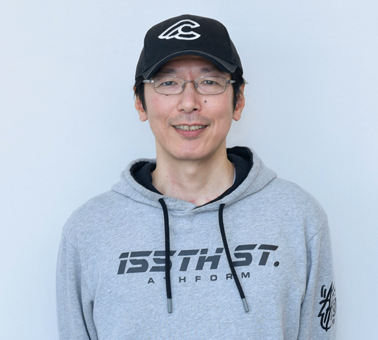
Kouki Saitou
Illustrator
He has been working on Pokémon TCG illustrations since 2002, depicting the liveliness and charm of Pokémon in a range of habitats. His work for Pokémon is not limited to the Trading Card Game—he has also provided artwork for products offered at the Pokémon Center and more.
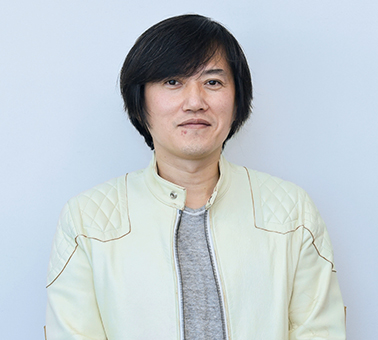
Tomokazu Komiya
Illustrator
In addition to providing illustrations for the Pokémon TCG since its debut, he has also worked on Pokémon Center merchandise. His art has also been published in children’s books and popular magazines.
Introduction
Q: Tell us about your history with the Pokémon TCG.
Komiya: After I graduated from high school, I enrolled in a vocational school called the Toyo Institute of Art and Design. I started working on the Pokémon TCG in 1996, at the age of 25. I’ve been a freelance illustrator ever since.
Q: Why did you choose to become a professional illustrator?
Komiya: When I was still in art school, a friend of mine invited me to sell postcards decorated with my art at a flea market. A customer stopped to look at them and asked me whether I was a student or a professional artist. She told me that I could make it as a pro; she was an illustrator herself, and recommended that I apply to the Shogakukan-published women’s magazine that she worked on.
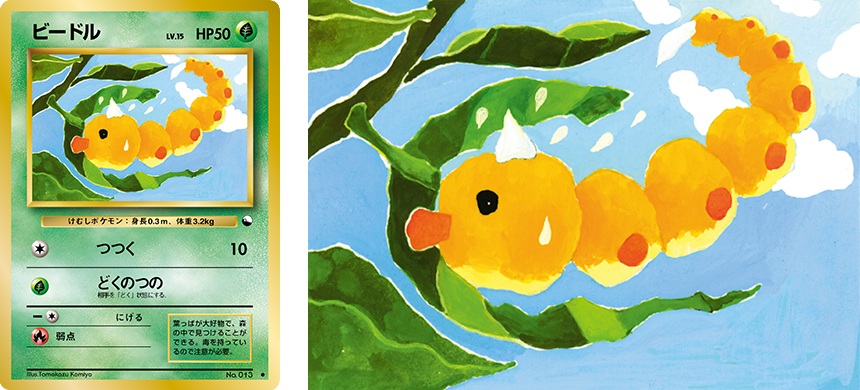
“Weedle” Illustrator: Tomokazu Komiya
Only released in Japan, in 1998
Q: How about you, Saitou?
Saitou: I had my first big opportunity when, at a Comic Market, my first printed work caught the attention of someone who worked for a publisher. Drawing for a living had been a dream of mine since childhood, but I only started getting serious about it later in life. My major in college had nothing to do with art but that encounter rekindled my childhood dream, so I started working towards becoming a commercial illustrator. Now this is embarrassing; I was overly confident in my abilities despite my inexperience back then, and so I decided to stay a freelancer. I met people through events and such and started building connections. Those connections eventually led to new work, which in turn, led to the opportunities that got me to where I am today.
I have been working on the Pokémon TCG since 2002. The first Pokémon I drew were Rapidash, Octillery, and Miltank. Miltank was received especially well. As a result, I was entrusted with many more illustrations for the Pokémon franchise.
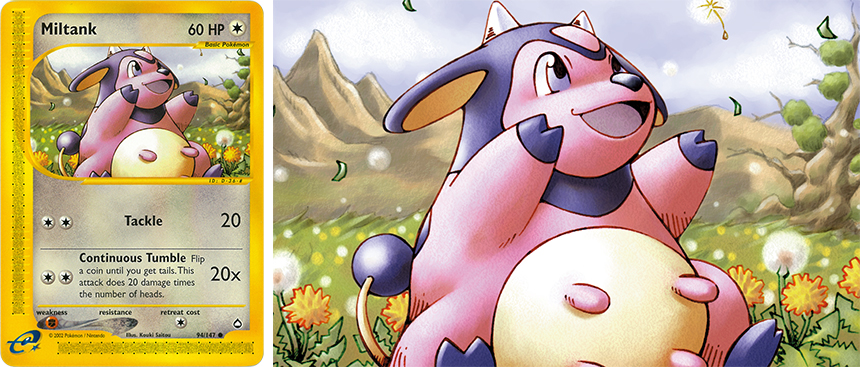
* Image is scanned data of the actual card.
“Miltank” Illustrator: Kouki Saitou
Included in Pokémon TCG: Aquapolis
Q: Is there a piece of merchandise that you worked on that is particularly memorable for you?
Saitou: That would be the Poncho-wearing Pikachu series. I was asked to draw a front view of Pikachu wearing a mega Charizard Y poncho, but, on a whim, I also sent in a sketch of Pikachu roaring. That sketch ended up being incorporated into other Pokémon products. This series holds a very special place in my heart because of how something I did for fun led to the creation of a new product.
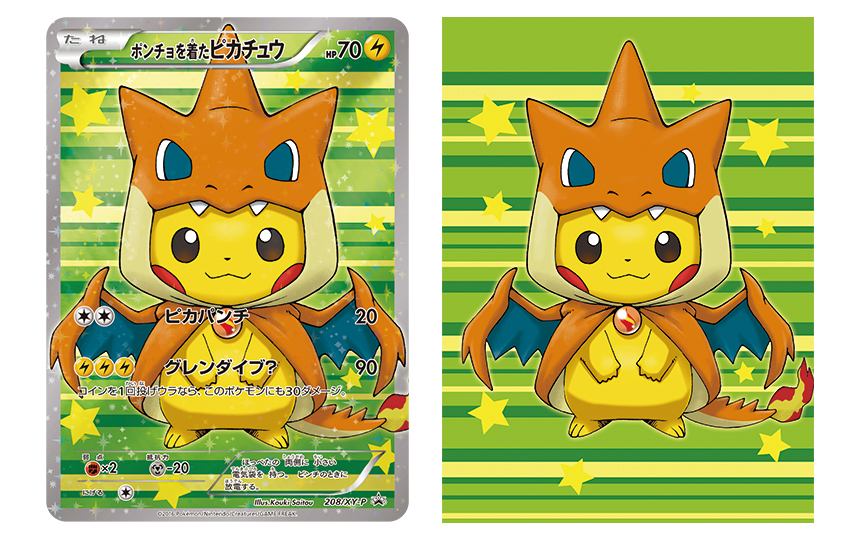
“Pikachu in a Poncho” Illustrator: Kouki Saitou
Only released in Japan, in 2016
Style Differences Between Komiya and Saitou
Q: When comparing your illustrations, there is the impression that Komiya goes for a unique style, whereas Saitou prefers a more classic look. Tell us what principles guide you when drawing for the Pokémon TCG.
Komiya: I also like that classic, orthodox style of illustration. If I were to rate my attempts at it, however, I couldn’t give them more than a three out of ten (laughs). I assume that when the children who love the Pokémon TCG grow up and look at the cards that they played with, my illustrations will fall under the “those weird ones” category. I did try to achieve that standard illustration style for a while, but I realized that nobody was asking for that from me, so I went back to my old style.
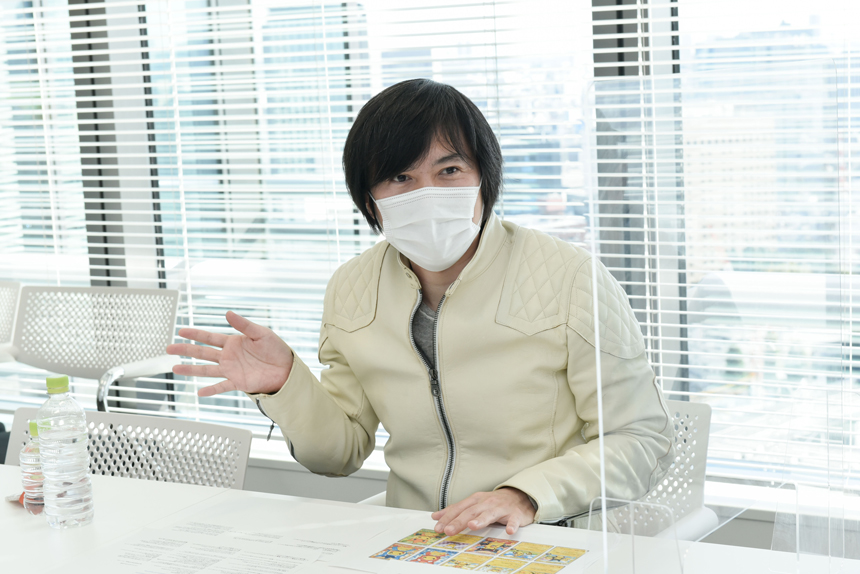
Q: You described your own style as “faking it” in the past, didn’t you? (Laughs.)
Komiya: Precisely! I’m fully aware of my limitations when it comes to drawing. I specialize in water and oil painting rather than classic illustration. I’m mainly an oils artist (laughs).
Saitou: As a Pokémon TCG Official Illustrator, I think that my job is to show users what a Pokémon truly looks like, their natural coloration, and so on. Since Pokémon are living beings, I try to draw them going about their daily lives in their natural habitats. My philosophy is to draw illustrations that will make users truly feel the presence of Pokémon.
Q: How do you adjust a landscape to fit the Pokémon that will go in it?
Saitou: The sense of air and the amount of light are important. Those are two of the main elements to express that a Pokémon is there.
Q: Drawing air and light sounds very difficult.
Saitou: It is. That’s why I’m always struggling with my art (laughs).
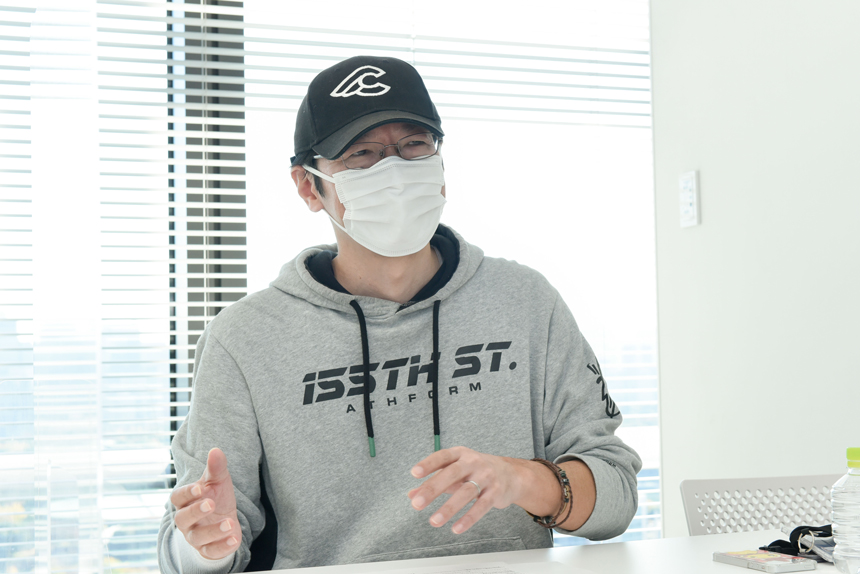
Equipment and Drawing Materials
Q: What kind of equipment and materials do you use to create your illustrations?
Saitou: In the past, my workflow involved drawing both on paper and digitally. I would sketch with a mechanical pencil on copy paper, then trace the outline with color ink on manga drawing paper, scan that outline, and finally digitally color it on my PC. The software I used is called Painter.
Over time, as technologies evolved, I switched from Painter to Photoshop and started drawing the outlines digitally as well. Nowadays, I even do my rough sketches on the PC as the pen tool in CLIP STUDIO PAINT is very comfortable to use.
Komiya: I mainly use acrylic gouache and then touch it up with pencils, colored pencils, ballpoint pens, markers, etc.
Saitou: I color digitally because gouache is too difficult for me. (Laughs.)
Q: So, you prefer drawing on paper with a variety of tools.
Komiya: I use just about every tool I can get my hands on (laughs)! If I keep doing the same thing for too long, I get bored. That’s one of the reasons why I use different drawing materials.
Q: Markers sound like an unusual tool for illustrators.
Komiya: Digital drawing allows you to create vivid, perfect black lines. You can even get some gentle hues too. But if you’re drawing on paper, blacks tend to look dull. That’s why I thought that using markers to get bold, strong black lines would be a good idea.
Illustrations That Are Important to You
Q: Which one of your card illustrations is your favorite?
Saitou: The one that is the most memorable for me was the first Pokémon TCG illustration I drew that was accepted by The Pokémon Company. After that first one, I was able to work on more cards for the Pokémon TCG and merchandise for the Pokémon Center as well. I’m grateful for the opportunities that arose from that illustration—it gave me many more chances to draw the Pokémon I love so much.
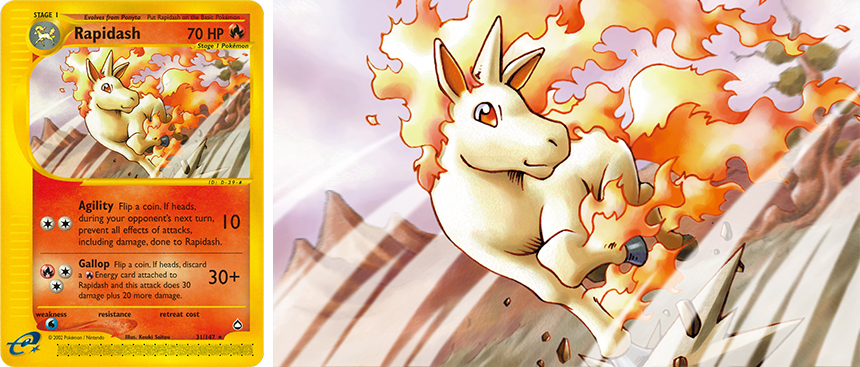
“Rapidash” Illustrator: Kouki Saitou
Included in Pokémon TCG: Aquapolis
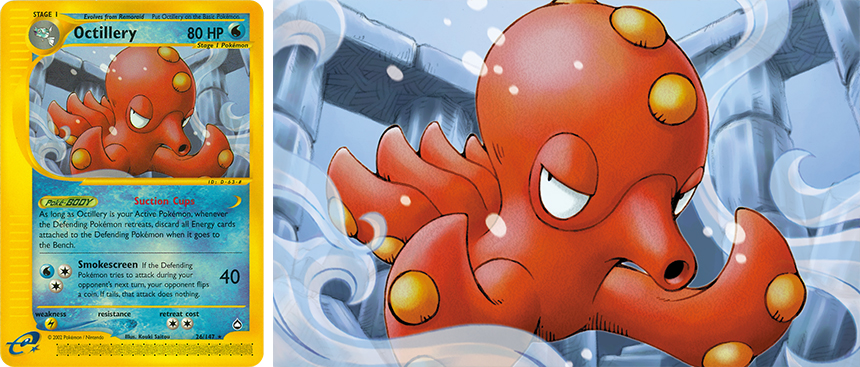
“Octillery” Illustrator: Kouki Saitou
Included in Pokémon TCG: Aquapolis
Komiya: For me, it’s Ledyba. I remember going online to see what users overseas thought of it and reading a comment to the effect of, “Why is Ledyba crying?! It’s nonsense!”
I felt that illustration was going to make some users mad, and that comment confirmed my suspicions.
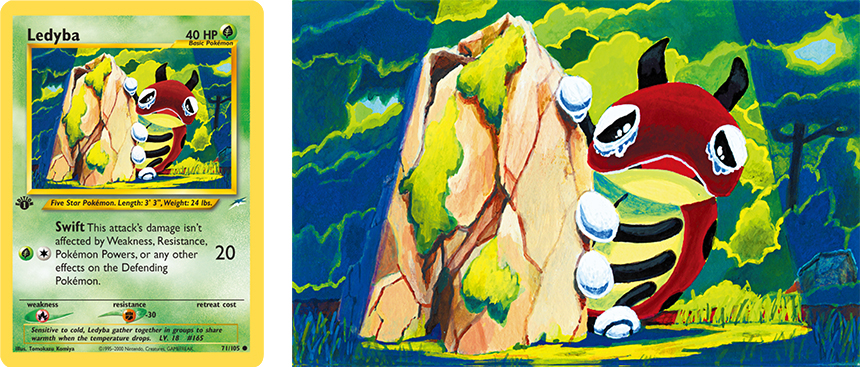
“Ledyba” Illustrator: Tomokazu Komiya
Included in Pokémon TCG: Neo Destiny
Q: Which is your favorite illustration from each other’s work?
Komiya: I really love the way Saitou tackles composition. All his illustrations are beautifully composed. Two specific examples of this would be Meditite and Azumarill.
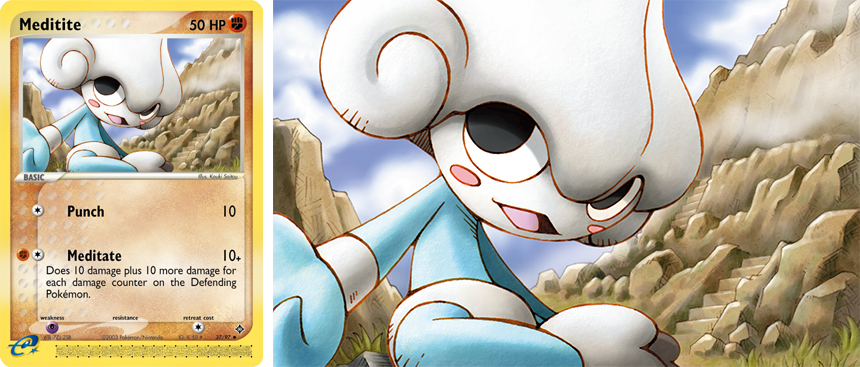
“Meditite” Illustrator: Kouki Saitou
Included in Pokémon TCG: EX Dragon
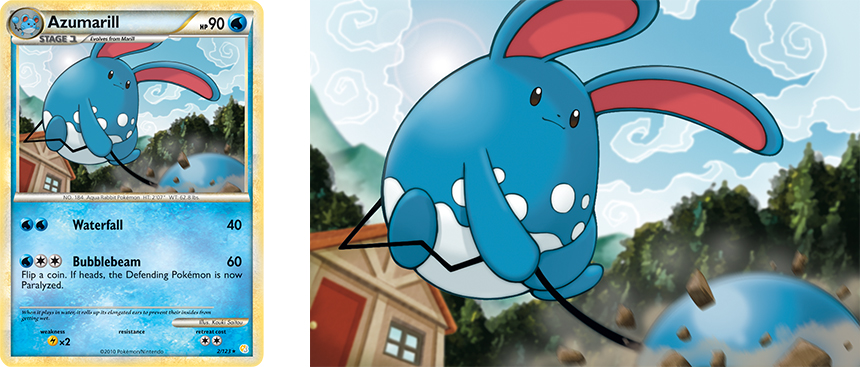
“Azumarill” Illustrator: Kouki Saitou
Included in Pokémon TCG: HeartGold & SoulSilver
Q: What do you like about the composition in Saitou’s illustrations?
Komiya: It’s difficult to express in words. I’d say it’s the use of negative space and margins. When I first saw one of Saitou’s illustrations, I could tell instantly just how talented he is.
Saitou: I still struggle a lot with composition when I’m drawing large or long Pokémon though. (Laughs.) But it feels so good when you finally nail it.
Komiya: It really does! I know that feeling.
Saitou: Komiya has been working on the Pokémon TCG longer than I have. His style is so memorable that you can immediately recognize his illustrations. The one I like the most among all of them is definitely Delibird. The movements it’s making and the effort it’s exerting are conveyed in a very impressive way. I love the sneaky expression on its face (laughs)!
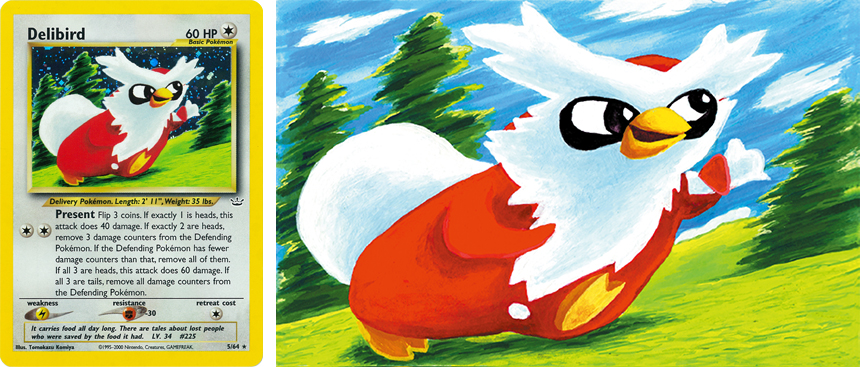
“Delibird” Illustrator: Tomokazu Komiya
Included in Pokémon TCG: Neo Revelation
Komiya: By the way, a young relative of mine who lives in the Kyushu region of southern Japan collects Pokémon TCG cards. One day, he saw my name on a card and realized that his relative had drawn the illustration. He then showed the card to my grandmother who also lives in the region, and she was happy to see that I was working hard! (Laughs.)
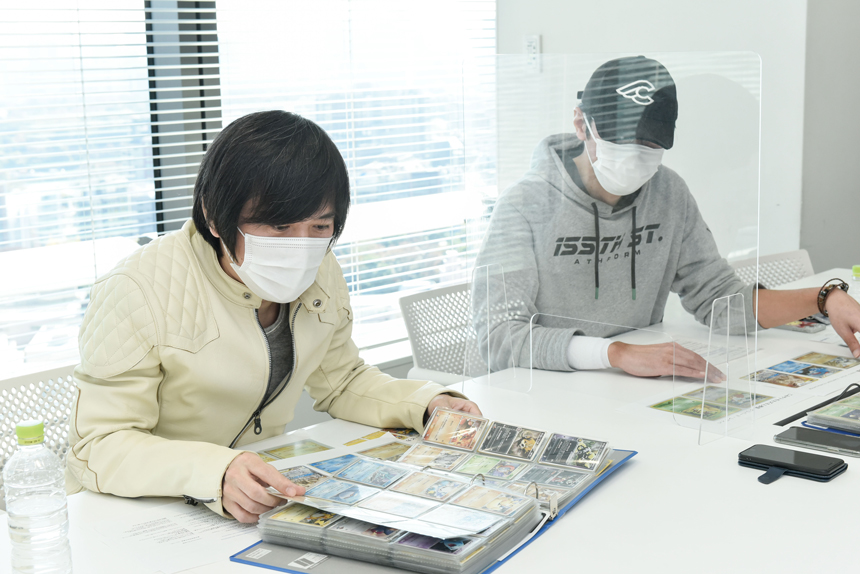
A Message for the Pokémon Trading Card Game Illustration Contest 2022
Q: You both will be judges for the Pokémon Trading Card Game Illustration Contest 2022. What are you looking forward to most in judging the submitted works?
Komiya: I’m looking forward to seeing the best of the best from the new generation of artists who’ve been accustomed to computers for their whole lives.
Saitou: I’m glad to say this is my second time judging for the illustration contest. The contestants turn in a ton of beautiful illustrations, and I can’t wait to see them. At the same time, I’m a bit nervous. I believe that being a judge is a huge responsibility and that I should take it very seriously. As a judge, I hope to make use of the knowledge I’ve accumulated throughout my years of drawing illustrations for the Pokémon TCG.
Q: Finally, do you have any comments for those who became interested in the Pokémon TCG because of this contest, or for those who applied and are waiting for the results?
Saitou: If you just learned about the Pokémon TCG from this contest, you have a huge array of cards to discover. There are many ways to enjoy these cards. You can battle with them, trade them with your friends, simply enjoy the illustrations, and even collect cards featuring artists that you particularly like. Creating cards that people want to own is the first step in having them enjoy the Pokémon TCG. I hope that you will find a card that makes you smile.
Komiya: I imagine that if you are waiting for the contest’s results, you must be nervous. Try to enjoy and savor this nervousness. Do your best and remember to have fun.
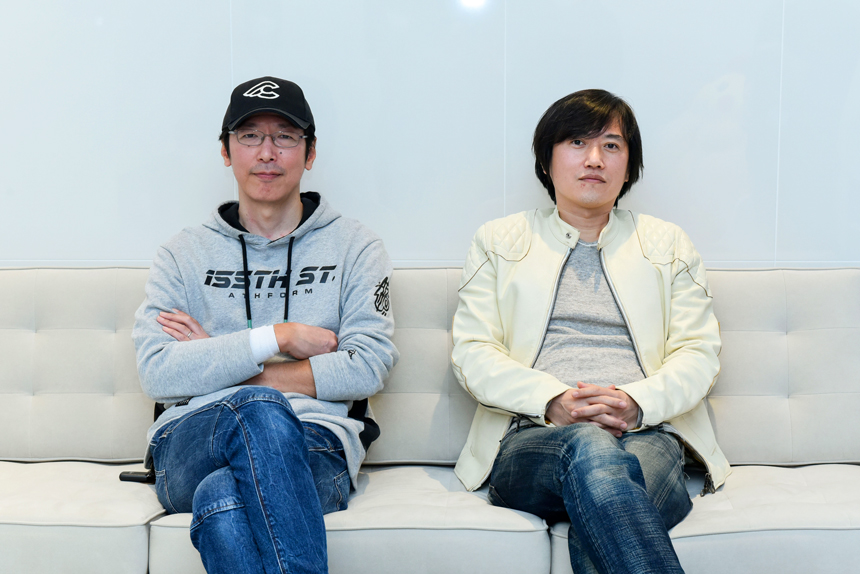
Composition and text: Shusuke Motomiya (One-up) Photos: Kayoko Yamamoto